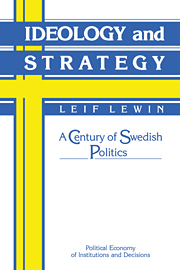Book contents
- Frontmatter
- Contents
- List of tables
- Series editors' preface
- Author's preface
- 1 The problem of rationality
- 2 Tariffs
- 3 Suffrage
- 4 Parliamentarism
- 5 The crisis agreement
- 6 Economic planning
- 7 The supplementary pension system
- 8 Nuclear power
- 9 Employee investment funds
- 10 Strategic action in politics
- Appendix
- Index
6 - Economic planning
Published online by Cambridge University Press: 29 September 2009
- Frontmatter
- Contents
- List of tables
- Series editors' preface
- Author's preface
- 1 The problem of rationality
- 2 Tariffs
- 3 Suffrage
- 4 Parliamentarism
- 5 The crisis agreement
- 6 Economic planning
- 7 The supplementary pension system
- 8 Nuclear power
- 9 Employee investment funds
- 10 Strategic action in politics
- Appendix
- Index
Summary
PLANNING FOR THE POSTWAR PERIOD
The outbreak of World War II brought a pause in the debate on economic planning. The ideological dispute on the role of the state in the business sector gave way to a truce as wartime regulation was imposed on the economy. Under the leadership of Per Albin Hansson, a grand coalition government was formed. It included representatives of the Social Democrats, Conservatives, Liberals, and Agrarians. The detailed regulation of the country's economic life that now took effect was supported by all social classes. Employees refrained from demanding extra pay to compensate for high wartime prices. Consumers felt called upon to accept a rationing system, manufacturers went along with price freezes and government direction, and special-interest organizations relinquished their independence and participated in the wartime economy as administrative bodies. To express this consensus, different groups chose stylistic approaches that best suited their varying traditional world views. In the conservative camp, it seemed natural to appeal for national unity in the face of danger and to call on special interests to subordinate themselves to the best interests of the country. In the Social Democratic camp, leaders preferred to describe the necessary economic regulation in terms that might conjure up the image of an economy dedicated to meeting social needs, which had always been the ideal of socialism.
- Type
- Chapter
- Information
- Ideology and StrategyA Century of Swedish Politics, pp. 159 - 203Publisher: Cambridge University PressPrint publication year: 1989

